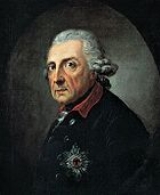
Frederick II of Prussia
Overview
Frederick II was a King in Prussia
(1740–1772) and a King of Prussia
(1772–1786) from the Hohenzollern dynasty
. In his role as a prince-elector
of the Holy Roman Empire
, he was also Elector of Brandenburg
. He was in personal union
the sovereign prince of the Principality of Neuchâtel. He became known as Frederick the Great (Friedrich der Große) and was nicknamed Der Alte Fritz ("Old Fritz
").
Interested primarily in music and philosophy and not the arts of war during his youth, Frederick unsuccessfully attempted to flee from his authoritarian father, Frederick William I
, with childhood friend, Hans Hermann von Katte
, whose execution he was forced to watch after they had been captured.
King in Prussia
King in Prussia was a title used by the Electors of Brandenburg from 1701 to 1772. Subsequently they used the title King of Prussia....
(1740–1772) and a King of Prussia
King of Prussia
King of Prussia may refer to:* A ruler of the former German state of Prussia**List of rulers of Prussia* Place names** King of Prussia, Pennsylvania* Shopping Centers** King of Prussia Mall...
(1772–1786) from the Hohenzollern dynasty
House of Hohenzollern
The House of Hohenzollern is a noble family and royal dynasty of electors, kings and emperors of Prussia, Germany and Romania. It originated in the area around the town of Hechingen in Swabia during the 11th century. They took their name from their ancestral home, the Burg Hohenzollern castle near...
. In his role as a prince-elector
Prince-elector
The Prince-electors of the Holy Roman Empire were the members of the electoral college of the Holy Roman Empire, having the function of electing the Roman king or, from the middle of the 16th century onwards, directly the Holy Roman Emperor.The heir-apparent to a prince-elector was known as an...
of the Holy Roman Empire
Holy Roman Empire
The Holy Roman Empire was a realm that existed from 962 to 1806 in Central Europe.It was ruled by the Holy Roman Emperor. Its character changed during the Middle Ages and the Early Modern period, when the power of the emperor gradually weakened in favour of the princes...
, he was also Elector of Brandenburg
Margraviate of Brandenburg
The Margraviate of Brandenburg was a major principality of the Holy Roman Empire from 1157 to 1806. Also known as the March of Brandenburg , it played a pivotal role in the history of Germany and Central Europe....
. He was in personal union
Personal union
A personal union is the combination by which two or more different states have the same monarch while their boundaries, their laws and their interests remain distinct. It should not be confused with a federation which is internationally considered a single state...
the sovereign prince of the Principality of Neuchâtel. He became known as Frederick the Great (Friedrich der Große) and was nicknamed Der Alte Fritz ("Old Fritz
Fritz
Fritz originated as a German nickname for Friedrich, or Frederick , as well as for similar names including Fridolin...
").
Interested primarily in music and philosophy and not the arts of war during his youth, Frederick unsuccessfully attempted to flee from his authoritarian father, Frederick William I
Frederick William I of Prussia
Frederick William I of the House of Hohenzollern, was the King in Prussia and Elector of Brandenburg from 1713 until his death...
, with childhood friend, Hans Hermann von Katte
Hans Hermann von Katte
Hans Hermann von Katte was a Lieutenant of the Prussian Army and close friend and possibly lover of the future Frederick II of Prussia, then the Crown Prince. He was executed by Frederick's father King Frederick William I of Prussia when he and Frederick plotted to escape from the Kingdom of...
, whose execution he was forced to watch after they had been captured.
Quotations
A single Voltaire will do more honor to France than a thousand pedants, a thousand false wits, a thousand great men of inferior order.![]()
Letters of Voltaire and Frederick the Great (New York: Brentano's, 1927), trans. Richard Aldington, letter 48 from Frederick to Voltaire (1740-01-06)
Neither antiquity nor any other nation has imagined a more atrocious and blasphemous absurdity than that of eating God. — This is how Christians treat the autocrat of the universe.![]()
Letters of Voltaire and Frederick the Great (New York: Brentano's, 1927), trans. Richard Aldington, letter 215 from Frederick to Voltaire (1776-03-19)
As to your Isaac Newton|Newton, I confess I do not understand his void and his gravity; I admit he has demonstrated the movement of the heavenly bodies with more exactitude than his forerunners; but you will admit it is an absurdity to maintain the existence of Nothing.![]()
Letters of Voltaire and Frederick the Great (New York: Brentano's, 1927), trans. Richard Aldington, letter 221 from Frederick to Voltaire (1777-11-25)

